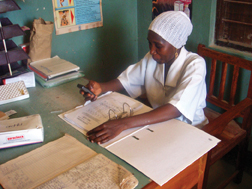Using cell phones, 52 participating health facilities report weekly malaria data via a customized text messaging menu.

Using a cell phone, a health worker enters data into Zanzibar’s early case detection and reporting system, made possible through a novel public-private partnership. Source: Hafidh Mohammed/RTI
Malaria has declined to such low levels on Zanzibar that early detection and prompt reporting of malaria cases have become critical to prevent outbreaks. Using cell phones, 52 participating health facilities report weekly malaria data via a customized text messaging menu. This innovative approach has been made possible through a public-private partnership between Selcom wireless, (a Tanzanian information technology company), the Zanzibar Malaria Control Program (ZMCP), PMI, and Research Triangle Institute. The malaria data are transmitted to a secure computer server, processed, and then sent to the ZMCP program manager,district medical officers, and other MOH authorities. When the number of weekly laboratory-confirmed malaria cases exceeds the average number of cases from the previous three-month period, representatives from the district health management team and ZMCP visit the health facility within 24 hours. If an outbreak is confirmed, the district surveillance officer will notify the affected community and alert all health facilities in the affected district. Officials will then make house-to-house visits to provide presumptive ACT treatment to all residents with a fever, regardless of whether they have laboratory-confirmed malaria. Officials may also decide to initiate selective IRS to supplement the already high levels of ITN ownership and usage.
